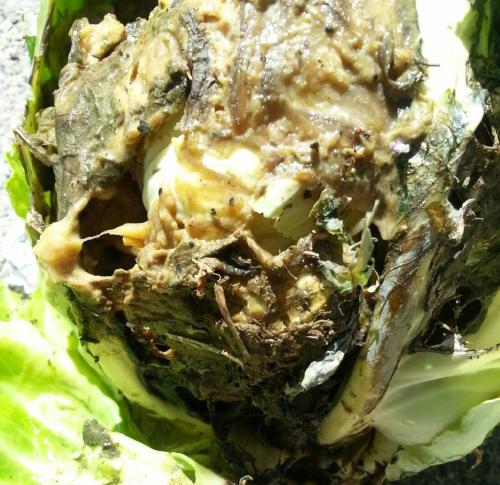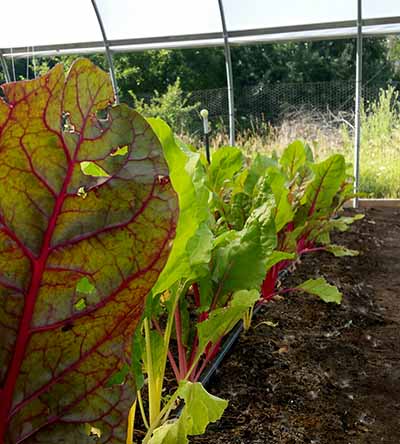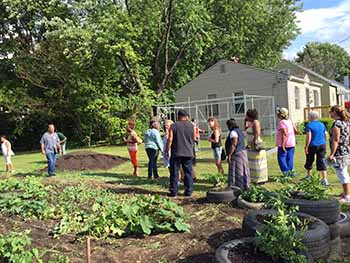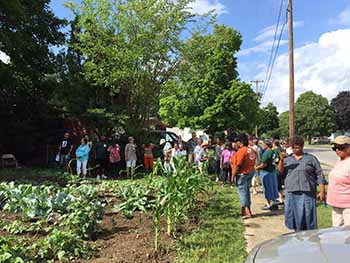Flint, Michigan area urban agriculture report – August 5, 2015
The edible flint Food Garden Tour showcased 17 of the area’s urban farms and gardens on July 29.

Weather
According to the Michigan State University Enviro-weather station in Flint, Michigan, temperatures for the past week ranged from a low of 58.3 degrees Fahrenheit to a high of 91.7 F. We are at 1,774 growing degree days (GDD) base 50; our seasonal totals got a bump up from this past week’s heat in terms of degree-day totals. The rainfall total for the year to date in Flint, Michigan, is 15.07 inches; we had 1.36 inches recorded at the Flint Enviro-weather station in the past week, primarily with Sunday’s big storm. For many soils, this rainfall replenished needed soil moisture.
Crop reports
Disease concerns in our vegetable crops remain high, with nearby Saginaw, Tuscola and Lapeer counties experiencing confirmed cases of downy mildew in cucumbers. Late blight in potatoes was recently found in central Michigan’s Montcalm County.
According to research at the hoop houses located at the MSU Student Organic Farm and educator observations from the field, cool season crops are being planted and warm season crops are being harvested out of area hoop houses due to season extension technology used by many of our area growers. In Flint, Michigan, area hoop houses and market gardens, growers are identifying pests and diseases, harvesting many crops, weeding, removing spent crops, preparing beds and seeding fall plantings of kale, carrots, lettuce, spinach, Asian greens and Swiss chard, as well as thinning fall crops recently planted.
Cabbage worms are still being found on farms and in community gardens this week. A bacterial rot on cauliflower was identified in a community garden this week, which often infects plants through surface areas injured by insects or other means. Warm, wet weather promotes the disease, and it has a distinctive foul odor.

Cabbage soft rot.
Powdery mildew on cucumbers continues. Growers need to be vigilant for downy mildew in cucumbers and late blight in tomato and potato crops as these serious diseases have been found in nearby counties. An online MSU resource, “A Pocket Guide to Common Diseases in the Urban Garden,” published in 2013, and the Hausbeck Lab website will be helpful resources for urban producers with the current disease concerns in our state.
Going to area farmers markets now
According to a Michigan State University Extension food systems educator, area growers are harvesting beets, basil, cilantro, mint, garlic, onion, cucumbers, beans, Swiss chard, kale, carrots, bell peppers and large amounts of tomatoes from area hoop houses this week. One grower is till harvesting strawberries from her outdoor plasticulture fields.

Swiss chard in a hoop house.
2015 Flint Food Garden and Farm tour
The 2015 seventh annual edible flint Food Garden Tour was held last Wednesday, July 29, with 247 participants riding buses or bikes to view 17 innovative and inspiring food gardens and farms in the Flint, Michigan, area. This annual food garden tour highlights the way the Flint community is addressing a number of challenges by showcasing a diversity of gardens that are transforming neighborhoods, increasing property values, employing youth, removing blight, increasing food access, improving diets and decreasing grocery bills. Tour participants learned how producers are tackling the challenges and opportunities of urban food growing. Some of the techniques on display were different trellising systems for vine type vegetables; rain water catchment and irrigation systems; square foot and unique container gardening; the use of hoop houses for season extension growing; non-herbicide weed and pest management practices; and demonstration gardens incorporating inclusion and accessibility gardening techniques.
Some of the gardens and farms grow and sell their produce at the Flint Farmer’s Market, others sell to downtown restaurants; one located at a homeless shelter provides fresh vegetables for their residents’ meals daily. Many of the community gardens sponsored by schools, churches and neighborhood groups designate a portion of their bounty to share with senior centers, neighbors and volunteers, increasing local resident’s access to fresh food and helping to transform neighborhoods by improving public safety.


Participants of the 2015 edible flint Food Garden Tour.



 Print
Print Email
Email

